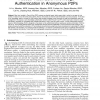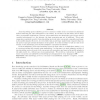152 search results - page 9 / 31 » Complex Zero-Knowledge Proofs of Knowledge Are Easy to Use |
116
Voted
TPDS
2008
15 years 10 days ago
2008
Most trust models in Peer-to-Peer (P2P) systems are identity based, which means that in order for one peer to trust another, it needs to know the other peer's identity. Hence,...
126
click to vote
IACR
2011
14 years 2 days ago
2011
Abstract. In Asiacrypt 2010, Groth constructed the only previously known sublinearcommunication NIZK argument for circuit satisfiability in the common reference string model. We p...
132
Voted
IACR
2011
14 years 2 days ago
2011
A zero-knowledge protocol allows a prover to convince a verifier of the correctness of a statement without disclosing any other information to the verifier. It is a basic tool a...
120
Voted
ASIACRYPT
2011
Springer
14 years 13 days ago
2011
Springer
A fundamental question in cryptography deals with understanding the role that randomness plays in cryptographic protocols and to what extent it is necessary. One particular line o...
102
click to vote
ASIACRYPT
2004
Springer
15 years 5 months ago
2004
Springer
In the bare public-key model, introduced by Canetti et al. [STOC 2000], it is only assumed that each verifier deposits during a setup phase a public key in a file accessible by a...


